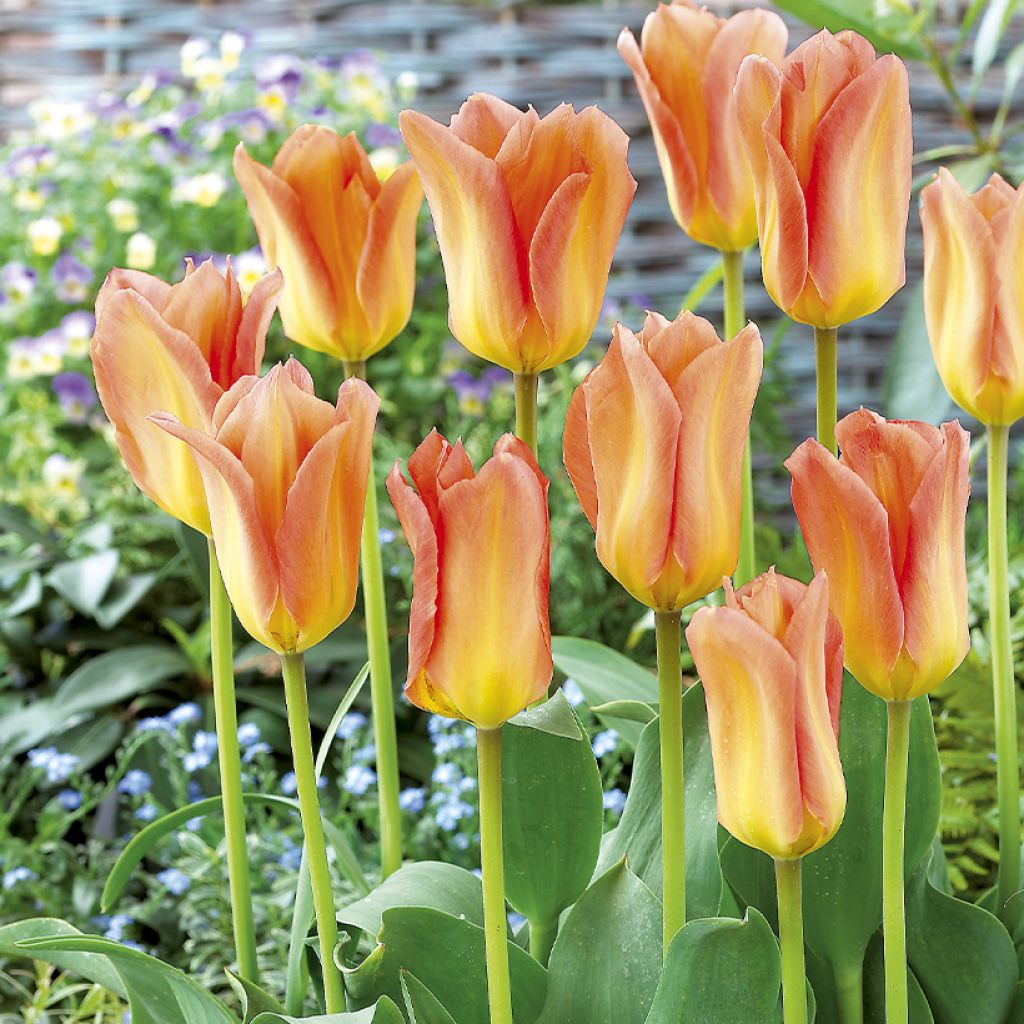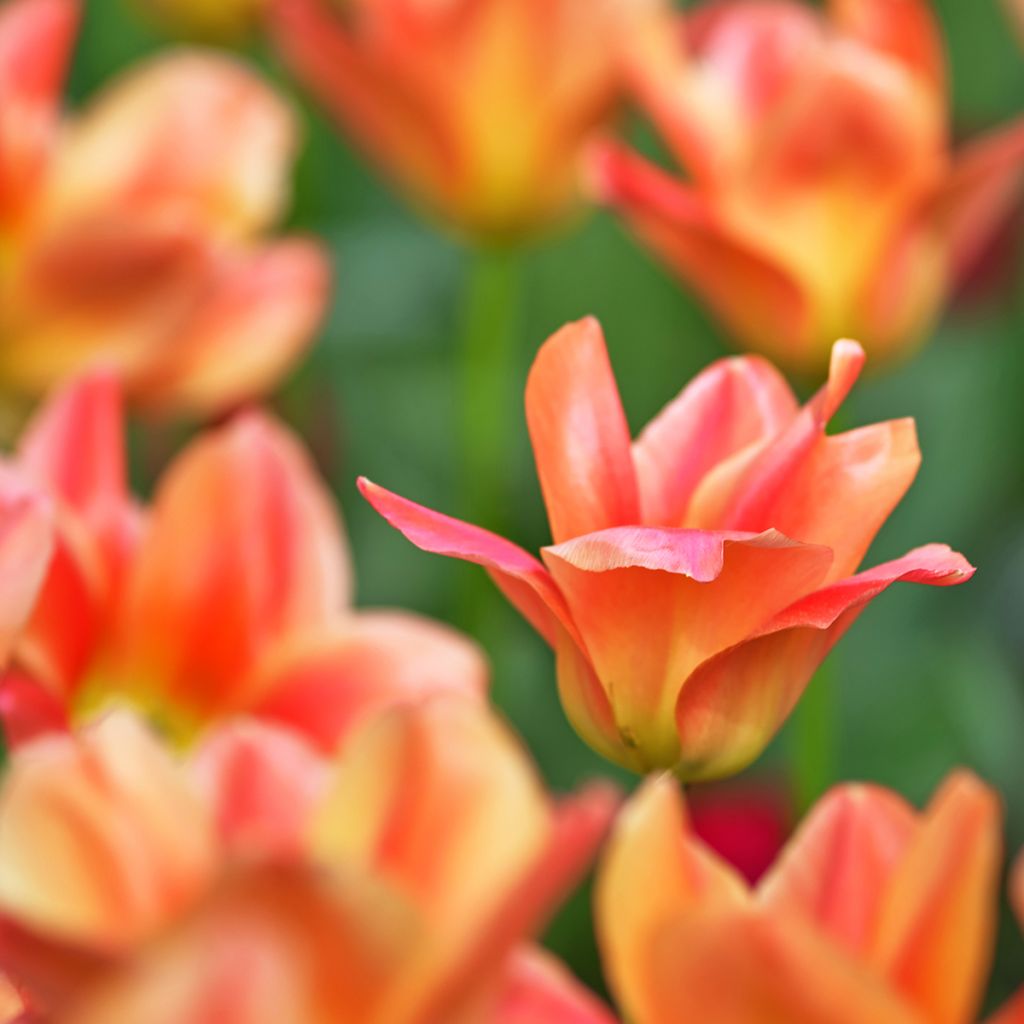

Tulipa fosteriana Apricot Emperor


Tulipa fosteriana Apricot Emperor
Tulipa fosteriana Apricot Emperor
Tulipa fosteriana Apricot Emperor
Fosteriana Tulip
I wanted to renew my stock of bulbs of this orange variety that I really like. What a surprise when they flowered two weeks ago: the tulips, although vigorous and homogeneous, were not orange but a beautiful bright yellow... Batch mix-up?
Daniel, 04/04/2025
Special offer!
Receive a €20 voucher for any order over €90 (excluding delivery costs, credit notes, and plastic-free options)!
1- Add your favorite plants to your cart.
2- Once you have reached €90, confirm your order (you can even choose the delivery date!).
3- As soon as your order is shipped, you will receive an email containing your voucher code, valid for 3 months (90 days).
Your voucher is unique and can only be used once, for any order with a minimum value of €20, excluding delivery costs.
Can be combined with other current offers, non-divisible and non-refundable.
This plant carries a 6 months recovery warranty
More information
We guarantee the quality of our plants for a full growing cycle, and will replace at our expense any plant that fails to recover under normal climatic and planting conditions.

Would this plant suit my garden?
Set up your Plantfit profile →
Description
The Tulip fosteriana 'Apricot Emperor is a pastel version of the beautiful 'Orange Emperor', it has the same qualities as its older sister. Its flowers in shades of apricot and soft orange open in particularly wide cups. The reverse of the petals, visible when the flowers are closed, is warmed by golden yellow and a touch of green. Robust and weather-resistant, this variety faithfully returns for several years and blooms early in the season, from mid-March, for several years. It is also a superb cut flower for bouquets.
The Tulipa fosteriana is a hardy botanical species originating from Turkestan. In horticulture, Fosteriana Tulips belong to Division 13 of the 15 divisions of tulips. They are reliable: they are the first garden tulips to bloom, sometimes as early as March 15, and they naturalise easily, so they do not need to be replaced regularly. The 'Apricot Emperor' variety was registered in 2002. This bulbous plant produces strong but flexible floral stems, 35 to 40 cm (14 to 16in) tall, bearing at their tips a large corolla that opens and widens in the sun to reveal its sweet orange shades. When fully open, it measures up to 18 cm (7in) in diameter. The foliage, absent in summer and winter, is a medium green.
Fosteriana tulips are suitable for all uses, in flower beds, borders, and even for taller varieties in bouquets. The orange tones of 'Apricot Emperor' go well with white and blue. Plant it with blue hyacinths, muscaris, or with other orange or white tulips. Unmatched for bringing the colours of spring year after year to pots or sunny gardens, do not forget to consider the height and flowering period when designing your flower beds, as these parameters vary significantly from one cultivar to another. It is wise to plant a few more bulbs for cutting, as they make beautiful cut flowers that last a long time in a vase.
About botanical species: Tulip species can be found from Western Europe to China and Japan, including Eastern Europe, Asia Minor, Central Asia. Their range also includes North Africa and the Indian subcontinent. The centre of diversity for the genus is in the Pamir and Hindukush Mountains and the steppes of Kazakhstan.
In Europe, there are various botanical species, many of which are endangered. These are either large adventive tulips from cultivated fields, the most famous being the Agen tulip (Tulipa agenensis), or small tulips found in wooded areas or among rocks in the mountains. In cultivation, they are called "botanical tulips", and one of the most common is the wild tulip (Tulipa sylvestris), which used to often grow under the protection of vines. Its subspecies australis is known as the southern tulip.
Report an error about the product description
Tulipa fosteriana Apricot Emperor in pictures


Plant habit
Flowering
Foliage
Botanical data
Tulipa
fosteriana
Apricot Emperor
Liliaceae
Fosteriana Tulip
Cultivar or hybrid
Planting and care
Plant your tulips as soon as possible in a well-drained soil. Loosen the soil deeply. Plant them 15 cm (6in) deep (Bulbs should be covered with twice their height of soil). Space the bulbs a few cm apart, making sure they don't touch each other. Choose a sunny exposure for better flowering. After flowering, cut the flower stems and let the leaves dry completely before cutting them. After flowering, their foliage becomes unsightly and faded, we recommend planting Heucheras, Tiarellas, Brunneras, Bleeding Heart, Euphorbia Cyparissia, in the foreground of your flower beds, their foliage will enhance the colours of your tulips and during the season, they will elegantly conceal their yellowed leaves.
Planting period
Intended location
Care
-
, onOrder confirmed
Reply from on Promesse de fleurs
Haven't found what you were looking for?
Hardiness is the lowest winter temperature a plant can endure without suffering serious damage or even dying. However, hardiness is affected by location (a sheltered area, such as a patio), protection (winter cover) and soil type (hardiness is improved by well-drained soil).

Photo Sharing Terms & Conditions
In order to encourage gardeners to interact and share their experiences, Promesse de fleurs offers various media enabling content to be uploaded onto its Site - in particular via the ‘Photo sharing’ module.
The User agrees to refrain from:
- Posting any content that is illegal, prejudicial, insulting, racist, inciteful to hatred, revisionist, contrary to public decency, that infringes on privacy or on the privacy rights of third parties, in particular the publicity rights of persons and goods, intellectual property rights, or the right to privacy.
- Submitting content on behalf of a third party;
- Impersonate the identity of a third party and/or publish any personal information about a third party;
In general, the User undertakes to refrain from any unethical behaviour.
All Content (in particular text, comments, files, images, photos, videos, creative works, etc.), which may be subject to property or intellectual property rights, image or other private rights, shall remain the property of the User, subject to the limited rights granted by the terms of the licence granted by Promesse de fleurs as stated below. Users are at liberty to publish or not to publish such Content on the Site, notably via the ‘Photo Sharing’ facility, and accept that this Content shall be made public and freely accessible, notably on the Internet.
Users further acknowledge, undertake to have ,and guarantee that they hold all necessary rights and permissions to publish such material on the Site, in particular with regard to the legislation in force pertaining to any privacy, property, intellectual property, image, or contractual rights, or rights of any other nature. By publishing such Content on the Site, Users acknowledge accepting full liability as publishers of the Content within the meaning of the law, and grant Promesse de fleurs, free of charge, an inclusive, worldwide licence for the said Content for the entire duration of its publication, including all reproduction, representation, up/downloading, displaying, performing, transmission, and storage rights.
Users also grant permission for their name to be linked to the Content and accept that this link may not always be made available.
By engaging in posting material, Users consent to their Content becoming automatically accessible on the Internet, in particular on other sites and/or blogs and/or web pages of the Promesse de fleurs site, including in particular social pages and the Promesse de fleurs catalogue.
Users may secure the removal of entrusted content free of charge by issuing a simple request via our contact form.
The flowering period indicated on our website applies to countries and regions located in USDA zone 8 (France, the United Kingdom, Ireland, the Netherlands, etc.)
It will vary according to where you live:
- In zones 9 to 10 (Italy, Spain, Greece, etc.), flowering will occur about 2 to 4 weeks earlier.
- In zones 6 to 7 (Germany, Poland, Slovenia, and lower mountainous regions), flowering will be delayed by 2 to 3 weeks.
- In zone 5 (Central Europe, Scandinavia), blooming will be delayed by 3 to 5 weeks.
In temperate climates, pruning of spring-flowering shrubs (forsythia, spireas, etc.) should be done just after flowering.
Pruning of summer-flowering shrubs (Indian Lilac, Perovskia, etc.) can be done in winter or spring.
In cold regions as well as with frost-sensitive plants, avoid pruning too early when severe frosts may still occur.
The planting period indicated on our website applies to countries and regions located in USDA zone 8 (France, United Kingdom, Ireland, Netherlands).
It will vary according to where you live:
- In Mediterranean zones (Marseille, Madrid, Milan, etc.), autumn and winter are the best planting periods.
- In continental zones (Strasbourg, Munich, Vienna, etc.), delay planting by 2 to 3 weeks in spring and bring it forward by 2 to 4 weeks in autumn.
- In mountainous regions (the Alps, Pyrenees, Carpathians, etc.), it is best to plant in late spring (May-June) or late summer (August-September).
The harvesting period indicated on our website applies to countries and regions in USDA zone 8 (France, England, Ireland, the Netherlands).
In colder areas (Scandinavia, Poland, Austria...) fruit and vegetable harvests are likely to be delayed by 3-4 weeks.
In warmer areas (Italy, Spain, Greece, etc.), harvesting will probably take place earlier, depending on weather conditions.
The sowing periods indicated on our website apply to countries and regions within USDA Zone 8 (France, UK, Ireland, Netherlands).
In colder areas (Scandinavia, Poland, Austria...), delay any outdoor sowing by 3-4 weeks, or sow under glass.
In warmer climes (Italy, Spain, Greece, etc.), bring outdoor sowing forward by a few weeks.





























